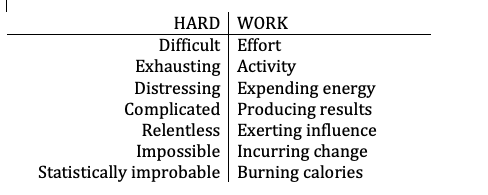A few weeks ago, I was having dinner with two former colleagues. Our conversation took many twists and turns going in and out of topics around work. Toward the end of our get-together, one of them said: “I work a lot harder than both of you!” Immediately, my other colleague and I took offense to that accusation and proceeded to defend ourselves: “No you don’t! We work hard. You have no idea how hard we work!” Without any of us making the case for why they are the person who works the hardest – it was getting late after all – we said our goodbyes.
But on my way home, I couldn’t stop thinking about our conversation. Am I working hard enough? Why does my colleague think that I don’t work as hard as she does? Should I be working harder?
Hard work is considered the cornerstone of success. There are numerous quotes about the link between hard work and success:
“ There are no secrets to success. It is the result of preparation, hard work, and learning from failure. “ – Colin Powell
“What separates the talented individual from the successful one is a lot of hard work.” – Stephen King
“The three great essentials to achieve anything worthwhile are: Hard work, stick-to-itiveness, and common sense.” – Thomas Edison
Then, there is a whole body of research of the 10,000-hour rule on deliberate practice, claiming that strategic and persistent repetition of a skill is what accounts for successful performance. In other work, hard work pays off.
If the people who have accomplished great things say hard work is the key to success, I am ready to roll up my sleeves and start working hard.
But the truth is, I have mixed feelings about working hard. The prospect of hard work doesn’t inspire me. When someone tells me “you have to work hard,” I don’t light up. I get stressed out just thinking about it. I get butterflies in my stomach and a mild headache. It doesn’t make me want to get started. It makes me want to procrastinate, to get distracted, to find other things to do, to take a nap, to go on vacation. And when I think about what my aversion to hard work could do to my future, I get really worried. I may have to rethink my life goals, lower my expectations, and settle for the status quo.
I know that this reaction goes against all dogma. It raises questions about work ethic. It contradicts everything that more prominent and more successful people than me keep saying: If you want to succeed, you have to work hard.
I started questioning what is wrong with me. Am I lazy? Am I scared? Am I entitled?
No. I just have no idea what work hard means. And I need your help to understand it.
You may think that you work hard. You may have hundreds of examples to support your belief. Or you may think that you don’t work hard enough and that this may be the cause of not advancing as fast in your career or your personal goals. You may believe that hard work is a key to success but also a gateway to burnout and exhaustion. You may expect that your hard work will pay off eventually. You may have the same averse reaction to hard work as I do.
But one question remains: Are we all talking about the same thing?
After much deliberation, I realized that what has been bothering me is not the act of hard work, but the concept of hard work. I have a hard time wrapping my head around the meaning of hard work, because the fact is that without context it means nothing. Or actually, it means a million different things. I came to the conclusion that to make hard work work for me, I need to understand it better. I need to know what working hard means so that I can do it more willingly and more effectively.
I turned to the dictionary. I broke down the term hard work, looked up each word separately and made lists of their definitions. See what happens when you put the different definitions side by side: (Table 1).

When you combine the two words – hard+work – the result is not only uninspiring. It is terrifying! Complicated and distressing activity. Relentless effort. Exhausting expenditure of energy. Difficult to produce results. Impossible to exert influence. Statistically improbable to incur change.
Who would like to sign up first?
I understand why having to work hard makes me feel deflated. Hard work sounds more like a warning or a threat, than an incentive or a reward. It is the obstacle that you have to overcome to get to the other side. Knowing that you have to work hard doesn’t make you feel inspired and energized. It makes you feel exhausted, cranky, stressed out, and even a little scared. There is no joy in it. No pleasure. No downtime. No free time. No end. No results. No life.
How is the prospect of hard work supposed to motivate you, to help you reach your goals, and to be successful? Were the quotes by Colin Powell, Stephen King, and Thomas Edison, intended as an inspiration or a deterrent?
Rest assured, I am neither lazy nor entitled. I trust the existing wisdom and I follow the advice of successful people as much as you do. But the concept of hard work is elusive, confusing, and ominous. It has become a vapid, overused cliché that gets more use than it has meaning. And the purpose of this exercise was to bring our awareness to the fact that whether we think we work hard or not hard enough, it is important to be clear about what we mean.
In my line of work, clarity is a means and an end, and that’s why one the most popular questions we ask is: “What do you mean by that?” Defining the things we talk about, explaining the labels we casually use to describe ourselves and other people, specifying the meaning of the words we employ to create our life narrative is significant. Definitions are not just semantics. They are powerful tools of self-awareness. They reshape our thinking. They broaden our perspective. They help us understand our emotions. They offer solutions to our problems. When we are clear about what we mean, we know what to do about it.
The above definitions of hard work may not resonate with you. After all, they are still too general and abstract. Your definition of hard work needs to be personal. It needs to reflect your own thoughts, your own feelings, your own circumstances. When you try coming up with your own, you may discover that you have more than one definition. Each time you tell yourself I work hard or I need to work harder you may mean something different.
Working hard is a badge of honor we all want to wear, even if it wears us down to the point of exhaustion. Sometimes hard work is desirable, and other times detestable. Sometimes it refers to volume, and other times to difficulty. But only by knowing what you mean, you will be able to reap the benefits of hard work without the toxic side effects.
Originally published at Psychology Today
